- Home
- Jack Higgins
Luciano's Luck Page 4
Luciano's Luck Read online
Page 4
‘He doesn't want to be found, sir.’
‘Could you find him?’
‘I've tried. Total silence so far. I've got a better chance than most people, though. He doesn't care for Americans. It seems he had a young brother called Cesare, who was a rumrunner on the Great Lakes during Prohibition. One night in 1929 Cesare was ambushed by a rival gang outside Chicago and personally shot three men dead. He died himself in the electric chair the following year.’
Eisenhower stood up. He paced up and down a couple of times, then turned to the map and stood looking up at it. ‘Still, one thing's for sure. If George Patton and his boys have to fight their way through those mountains to Palermo, they'll die by the thousands.’
He repeated the phrase in a whisper as if to himself. Carter knew that in his mind's eye, Eisenhower was seeing again the American dead on the battlefield of Kasserine, that terrible débâcle in which untried boys had found themselves faced with the cream of the Afrika Corps.
Carter cleared his throat. ‘With respect, General, I do have a suggestion.’
Eisenhower turned, suddenly alert. ‘And what might that be?’
‘After all is said and done, Luciano still seems to me the key figure in the whole affair. His influence with the Sicilian Mafia is unquestioned. He might provide the right link with Luca. Enough to make Luca come out of hiding and declare himself for us. If he does that, General, then we have Mafia on our side one hundred and ten percent.’
Eisenhower stood there for a long moment, staring at him, then nodded slowly. ‘Damn me, Major, but I have a sneaking suspicion you might be right.’
‘Then you'll put Intelligence in Washington on to it right away, sir?’ Carter said. ‘They could approach Luciano again during the next couple of days.’
‘I'll think about it.’ Eisenhower glanced at his watch. ‘And now you must excuse me. This is the time of day when the telephone lines start hotting up to Washington. I talk to the President most days. He likes to be kept informed.’
‘I'll go then, sir.’
Carter got up, put on his cap and saluted. Eisenhower acknowledged the salute perfunctorily, already busy with papers again, and Carter walked to the door.
As he got it open, Eisenhower called, ‘I'd like you back here at eleven.’
Carter turned in surprise. ‘You mean eleven tonight,
General?’
‘That's it, Major,’ Eisenhower replied without looking up.
Carter closed the door, paused, then crossed the hall to the entrance and went down the steps to his jeep. He climbed in beside the driver and glanced at his watch. It was just after six. Almost five hours to kill.
‘Where to now, sir?’ asked the driver, a private first class who looked at most sixteen year of age.
‘Do you know the RAF base at Maison Blanche?’
‘Sure do, Major. About an hour and a half from here.’
‘Fine,’ Carter said. ‘Take me there.’
The Douglas DC3, the famous Dakota, was probably the most successful general transport plane ever built, but the one which Wing Commander Harvey Grant was bringing back from Malta to his base at Maison Blanche just before dark had definitely seen better days.
Not that it was in any sense his regular plane. The old Dakota did a milk run to Malta and back three times a week with medical supplies. The duty pilot had been taken ill that morning, and as there was no replacement readily available, Grant had seized the opportunity to vacate the Squadron Commander's desk and do the flight himself. Which was very much contrary to regulations, for Grant had been forbidden any further operational flying by the Air Officer Commanding Middle East Theatre himself only six weeks previously.
He sat at the controls now, alone and happy, whistling tunelessly between his teeth, the two supply sergeants forming his crew asleep in the rear.
Harvey Grant was twenty-six, a small man whose dark eyes seemed perpetually full of life. Son of a wheat farmer in Parker, Iowa, the greatest influence on his life had been his father's younger brother, Templeton Grant, who had flown with the Royal Flying Corps in France.
At an early age, Grant learnt that you always watched the sun and never crossed the line alone under 10,000 feet. He soloed at sixteen, thanks to his uncle's tuition, then moved on to Harvard to study law, more to please his father than anything else. He was at the Sorbonne in Paris when war broke out, and promptly joined the RAF.
He was shot down twice piloting Hurricanes and had eleven German fighters to his credit before the Battle of Britain was over. He'd then transferred to Bomber Command, completing a tour in Wellingtons, a second in Lancasters, by which time he was a Squadron Leader with a DSO and two DFC's to his name.
After that had come his posting to 138 (Special Duties) Squadron at Tempsford, the famous Moon Squadron that specialized in dropping agents into ocupied Europe or picking them up again, as the occasion required.
Grant had flown over thirty such missions from Tempsford before being promoted and posted to Maison Blanche to handle the same kind of work, flying blackpainted Halifaxes from the Algerian mainland to Sardinia, Sicily and Italy.
But all that was behind him. Now he was officially grounded. Too valuable to risk losing, that's what the AOC had said, although in Grant's opinion, it was simply another manoeuvre on the part of the American Army Air Corps to force him to transfer, a fate he was determined to avoid.
He was southwest of Pantellaria just before dusk, a quartermoon touching the clouds with a pale luminosity, when a roaring filled the night. The Dakota bucked wildly so that it took everything Grant had to hold her as a dark shadow banked away to port.
He recognized it at once, a Junkers 88, one of those apparently clumsy, black, twin-engined planes festooned with strange radar aerials that had proved so devastating in their attacks on RAF bombers engaged on night raids over Europe. And he didn't have a thing to fight with except skill, for the Dakota carried no kind of armament.
The cabin door swung open behind him and the two supply sergeants peered in.
‘Hang on!’ Grant said. ‘I'm going to see if I can make him do something stupid.’
He went down fast and was aware of the Junkers, turning and coming in fast, firing his cannon too soon, his speed so excessive that he had to bank to port to avoid collision.
Which was exactly what Grant was counting on. He kept on going down, was at six hundred feet when the Junkers came in on his tail. This time the Dakota staggered under the impact of cannon shell. The Junkers curved away to starboard again and appeared to take up station.
‘Come on, you bastard! Come on!’ Grant said softly.
Behind him one of the sergeants appeared, blood on his face where a splinter had caught him. ‘Johnson's bought it.’
‘Okay,’ Grant said. ‘He's coming in again so get down on your face and hang on.’
He was no more than five hundred feet above the waves as the Junkers came in for the kill, judging his speed perfectly now, sliding in on the Dakota's tail, opening up with more cannon shell. As the aircraft started to shudder under their impact, Grant dropped his flaps.
The Dakota seemed to stop in midair. The pilot of the Junkers banked steeply to starboard to avoid a collision and, with no space left to work in at such a speed, kept right on going, ploughing straight into the sea.
Grant, depressed, walked towards the officers’ mess at Maison Blanche, his flying boots drubbing on the tarmac. He kept thinking of the way that Junkers had gone in, imagining the men inside. That was no good at all. He started up the steps to the mess and found Harry Carter standing at the top.
‘Harry!’ Grant said in delight. ‘I heard you were in hospital in Cairo.’
‘Not any more,’ Carter told him. ‘I had business with the man himself at dar el Ouad and as I have an hour or two to spare, I thought I'd see how you were getting on.’
On the two occasions that Carter had dropped by parachute into Sicily, Grant had flown the plane, which was something of a bond.
‘Not really. Let's take a walk.’
They moved towards the hangars. Carter said, ‘I hear you got another one this evening.’
‘In a manner of speaking.’
‘And you're suposed to be grounded.’
‘Damn nonsense. I had to see Air Marshal Sloane a few weeks ago on squadron business and he said I had a muscle twitching in my right cheek. Insisted I had a medical and the bastards stood me down.’
He was angry and it showed. Carter said, ‘We can win the war without you, Harvey, but only just.’ He put a hand on the American's shoulder for a moment. ‘What's wrong? What's really wrong?’
‘I keep thinking about the men in that Junkers this evening,’ Grant said. ‘I don't know how to explain this, Harry, but for the first time it was as if it was me. Does that make any kind of sense?’
‘Perfectly,’ Carter told him. ‘It means that the doctor who stood you down knew what he was talking about.’
Grant said, ‘And what about you? Are you going back over there again?’
‘I shouldn't think it's likely.’
‘And a good think, too.’ They were passing a hangar in which ground crew worked under floodlights repairing a badly damaged Halifax. Half the tail plane was missing and the rear gunner's compartment shattered. ‘Rear gunner and navigator both killed on a supply drop to Sicily two nights ago. The Luftwaffe really do have things their own way over there, Harry. We've lost four planes in ten days, all shot down, and in each case the agents they were to drop were still inside. If you asked me to fly you in again, I'd give us no better than an even chance of reaching the target and dropping you.’
‘Oh, well,’ Carter said. ‘Someone else can worry about that one.’
They had reached the end of the main hangar and he saw, to his surprise, a Junkers 88 night fighter standing there in the gloom, RAF rondels painted on the fuselage and wings.
‘What's this, for God's sake?’
‘Forced down up the coast a few weeks ago after dropping a couple of Arab agents by parachute. See where they cut a special door in the fuselage. This is a Ju88S, one of their best night fighters, capable of around four hundred miles an hour. We've been doing evaluation flights.’
‘You have, you mean.’
‘Well, an hour here and there.’ Grant shrugged. ‘Who's to notice?’ He clapped Carter on the shoulder. ‘So, what are you up to now? Something so secret the whole future of the war depends on it?’
Carter soiled. ‘There's no such animal, Harvey. Wars aren't won by men any more. They're run by large corporations, just like big business.’
‘Maybe you're right,’ Grant tossed his cigarette away. ‘You want to know something, Harry? I feel tired I mean really tired. So I don't care any more.’
‘It's the war, Harvey. It's gone on too long.’
‘Good,’ Grant said. ‘I mean, that really does make me feel a whole lot better. Now let's get back to the mess and I'll buy you a drink.’
*
When the jeep dropped Carter in the courtyard outside the villa, there was a big Packard staff car outside. Carter went up the steps past the sentries and found Cusak still sitting at the desk.
‘Doesn't anyone work around here except you?’ Carter enquired.
Cusak smiled. ‘I must admit it feels that way some days. He won't be long, sir. He has General Patton with him.’
Carter moved out on the terrace, wondering what it was Eisenhower wanted to see him about. A further discussion of the Sicilian situation perhaps and, yet, what more was there to say? It was all decided. Within the next few weeks, the big battalions would roll, the invasion would take place and, an unknown quantity of dead men later, Sicily would be in Allied hands. The Germans had lost the war, so much was obvious, so why didn't everyone simply get off at the next stop?
The door to Eisenhower's office opened and General George Patton walked across the hall. He wore field cap and heavy military greatcoat, his hands pushed deep into its pockets as if cold.
As Carter moved out of the shadows, Patton paused. ‘Are you Carter?’
‘That's right, sir.’
Patton stood there loking him over, a slight frown on his face. For a moment, it was as if he was about to speak; then he thought better of it, turned, and walked out without another word.
The telephone buzzed, Cusak picked it up. ‘Yes, General?’ He smiled briefly at Carter. ‘He'll see you now, Major.’
The room was dark, the only light the table lamp on the desk where Eisenhower sat working on a file in a haze of cigarette smoke. He glanced up as Carter entered and put down his pen.
‘You know, one thing they omitted to tell us when I was a cadet at West Point was the amount of paperwork that went into being Commander-in-Chief.’
‘If they did, maybe nobody would want the job, General.’
‘Exactly,’ Eisenhower grinned briefly and was then all business. ‘There's a Flying Fortress leaving Bone Airfield two hours from now, destination Prestwick in Scotland. From there, you'll fly straight on to Washington by the first available plane, Priority One. You should be there, with any luck, by early evening tomorrow. Captain Cusak will give you your documentation on the way out.’
‘I'm afraid I don't understand, sir.’
‘Of course you don't,’ Eisenhower replied. ‘You don't know what the hell I'm talking about so I'll tell you. I liked what you said about the Sicilian situation. It made sense, particularly the bit about this man Antonia Luca and the effect he could have on the campaign if he was found and brought in on our side.’
‘I see, sir.’
‘I've spoken on the matter to the President during our phone call earlier this evening. He agrees that anything that can help save the lives of our boys is worth trying. To that end, I want you to proceed to this penitentiary at Great Meadow to discuss further with Luciano the whole question of Mafia involvement in the invasion.’ He passed a buff envelope across. ‘There's your authority, in my name, to act in any way you see fit in this matter. It makes you answerable only to me and requires all personnel, military or civil, without distinction of rank, to assist you in any way you see fit. There will be a similar document waiting for you in Washington countersigned by the President.’
Carter stared down at the envelope, bewildered. ‘To do what, General?’
‘How in the hell do I know?’ Eisenhower said. ‘Talk to the man. See what he has to say. Yank him right out of that damn prison if you have to. You've got the power. Now, are you going to use it or aren't you?’
Carter, filled with an excitement he had not known in years, slipped the envelope into one of his tunic pockets and buttoned it carefully.
‘Oh, yes, sir.’
‘Good.’ Eisenhower nodded. ‘Another thing. I've arranged a promotion to full colonel for you. Only temporary, of course, but it should give you some extra muscle along the way.’
He turned before Carter could reply and switched on a lamp that illuminated the map of Sicily. He stood looking at it for a while and spoke without turning round. ‘Are you surprised that I'm willing to have dealings with people like Luciano?’
‘Frankly, sir, I think I've got well past being surprised at anything.’
‘The Nazis have plundered and raped Europe, murdered millions of people. The stories that are beginning to emerge about their treatment of the Jews are past belief and I'm of German stock myself. Have you any idea how that feels?’
‘I think so, sir,’ Carter said.
‘Oh, no, you haven't,’ Eisenhower shook his head. ‘To beat these people, Major, finish them once and for all, root and branch, I'd shake hands with the Devil himself if it were necessary.’
5
On his twentieth lap of the exercise yard at Great Meadow, Luciano increased his speed, running fast and free, the best moment of the day when there was an infinite possibility to things. Then, as usual, the north wall got in the way and he had to slow down.
&nb
sp; He walked back through a scattering of other prisoners, acknowledging a greeting here and there, to his usual spot in a corner by the landing where Franco waited with a towel.
‘You're getting better each day, Mr Luciano,’ Franco said.
He had the look of a professional wrestler and the build to go with it, a New York Sicilian who had killed many times on behalf of the Mafia and was serving a double life sentence for murder.
Luciano caught the towel as Franco threw it. ‘You reach my age, you got to keep in shape. Did you get that book from the library?’
‘I sure did, Mr Luciano.’
He passed it across, an English translation of The City of God by St Augustine. Luciano sat on the step and examined it with a conscious pleasure.
He was fortysix, a dark, handsome, saturnine man of medium height. The lid drooped slightly over the left eye, relic of an old wound. In spite of the drab prison uniform he was a man to be looked at twice, and not just because of the authority and selfsufficiency that were plainly indicated in the face. There was also that perpetual slight smile of contempt directed at the world in general.
Franco said, ‘Excuse me, Mr Luciano, but there's a kid here called Walton from D block. He needs a favour.’
Luciano looked up. Walton was a tall, gangling young man of twentyone or two with flat brown hair and arms that were too long for his shirt.
‘What's he in for?’ Luciano asked softly.
‘One to three. Liquor store holdup. No previous.’
‘Okay, let's see what he wants.’
Franco nodded to the boy, gave Luciano a cigarette and lit it for him. ‘Okay, speak your piece.’
Walton stood there, twisting his cap in his hand nervously. ‘Mr Luciano, they say you can do anything.’
‘Except sprout wings and fly out of this place.’ Luciano smiled softly. ‘What's to do, boy?’
‘It's like this, Mr Luciano. I've only been here two months and my wife, Carrie… well, she's on her own now and she's only a kid. Eighteen is all.’
‘So?’
‘There's a detective from the eighth precinct called O'Hara. He was one of the guys who pulled me in. He knows she's on her own and he's been pressuring her. You know what I mean?’

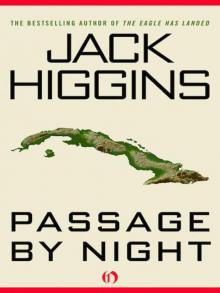 Passage by Night (v5)
Passage by Night (v5)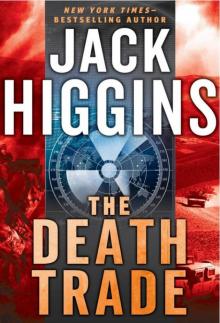 The Death Trade sd-20
The Death Trade sd-20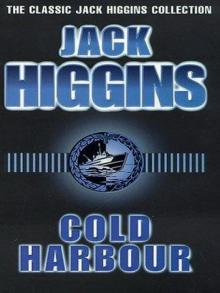 Cold Harbour
Cold Harbour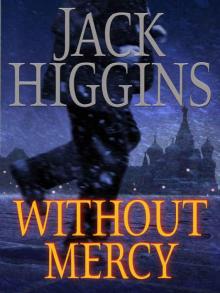 Without Mercy
Without Mercy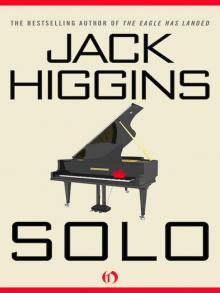 Solo (Aka the Cretan Lover)(1980)
Solo (Aka the Cretan Lover)(1980)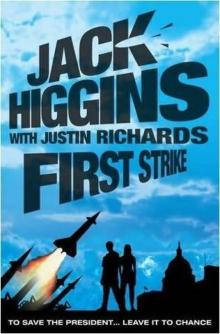 First Strike
First Strike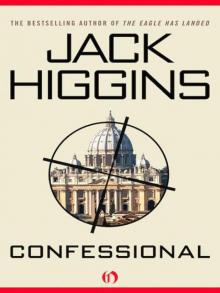 Confessional - Devlin 03 (v5)
Confessional - Devlin 03 (v5)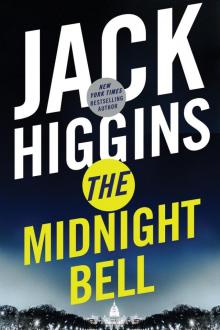 The Midnight Bell
The Midnight Bell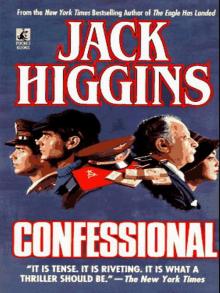 Confessional
Confessional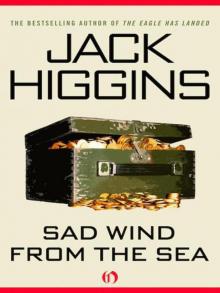 Sad Wind from the Sea (v5)
Sad Wind from the Sea (v5)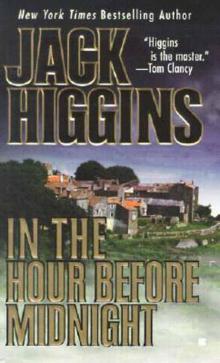 In The Hour Before Midnight aka The Sicilian Heritage
In The Hour Before Midnight aka The Sicilian Heritage Wrath of the Lion
Wrath of the Lion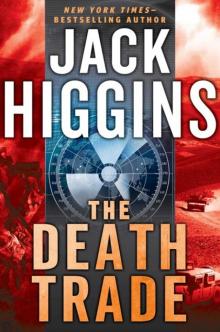 SDillon 20 - The Death Trade
SDillon 20 - The Death Trade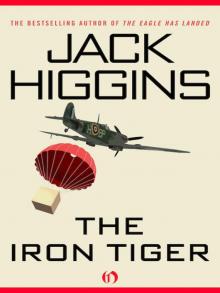 the Iron Tiger (1974)
the Iron Tiger (1974)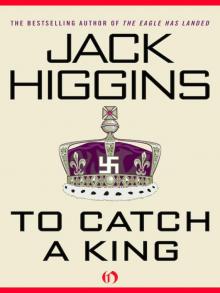 To Catch a King
To Catch a King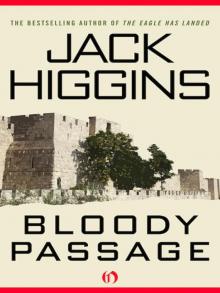 Bloody Passage (1999)
Bloody Passage (1999)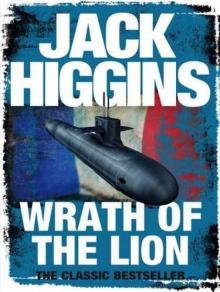 Wrath of the Lion sd-8
Wrath of the Lion sd-8 Sharp Shot
Sharp Shot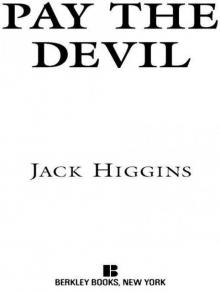 Pay the Devil (v5)
Pay the Devil (v5) A Devil Is Waiting
A Devil Is Waiting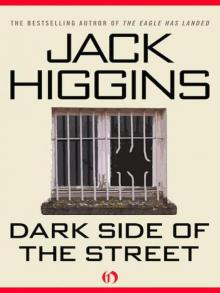 Dark Side of the Street - Simon Vaughn 01 (v5)
Dark Side of the Street - Simon Vaughn 01 (v5)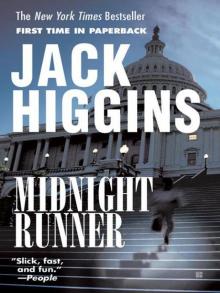 Midnight Runner - Sean Dillon 10
Midnight Runner - Sean Dillon 10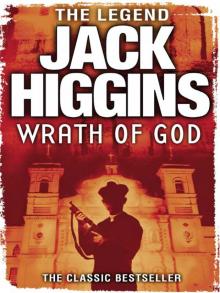 Wrath of God
Wrath of God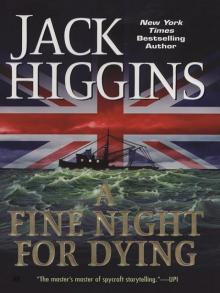 A Fine Night for Dying
A Fine Night for Dying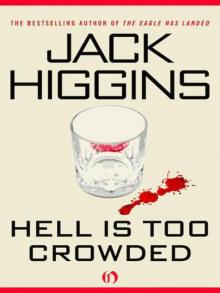 Hell Is Too Crowded v5)
Hell Is Too Crowded v5)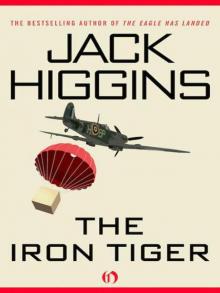 the Iron Tiger (v5)
the Iron Tiger (v5)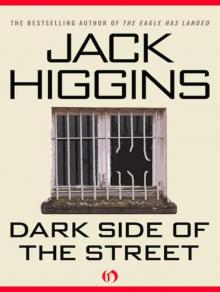 Dark Side of the Street pc-5
Dark Side of the Street pc-5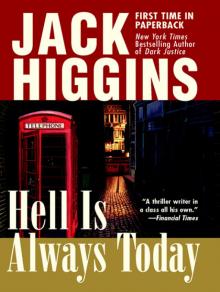 Hell Is Always Today
Hell Is Always Today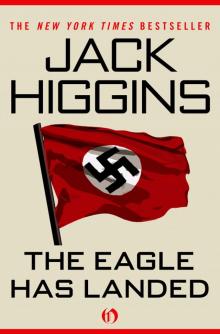 Eagle Has Landed
Eagle Has Landed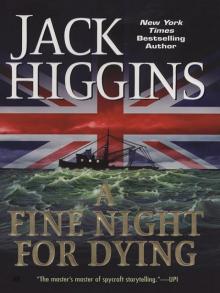 A Fine Night for Dying pc-6
A Fine Night for Dying pc-6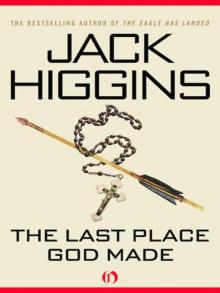 the Last Place God Made (v5)
the Last Place God Made (v5)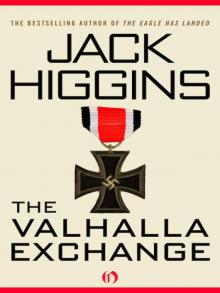 the Valhalla Exchange (1976)
the Valhalla Exchange (1976)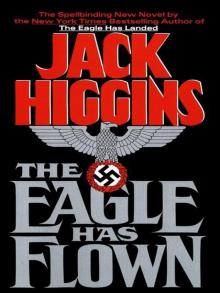 The Eagle Has Flown
The Eagle Has Flown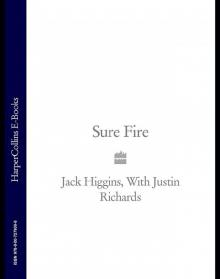 Sure Fire
Sure Fire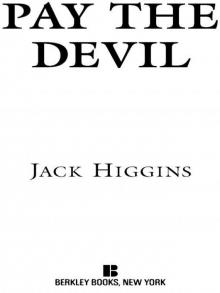 Pay the Devil (1999)
Pay the Devil (1999)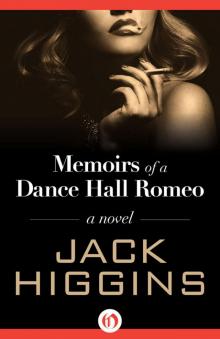 Memoirs of a Dance Hall Romeo
Memoirs of a Dance Hall Romeo![a Prayer for the Dying (1974)[1] Read online](http://i1.bookreadfree.com/i1/04/02/a_prayer_for_the_dying_19741_preview.jpg) a Prayer for the Dying (1974)[1]
a Prayer for the Dying (1974)[1]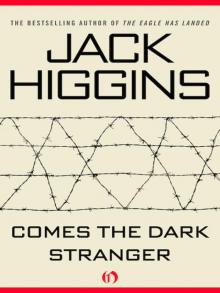 Comes the Dark Stranger
Comes the Dark Stranger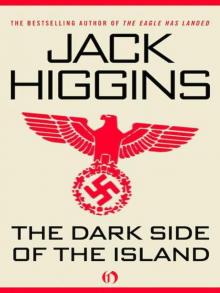 Dark Side Of the Island (v5)
Dark Side Of the Island (v5)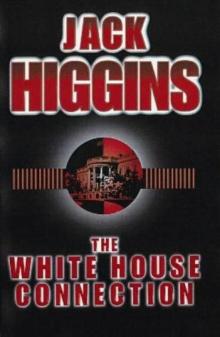 The White House Connection sd-7
The White House Connection sd-7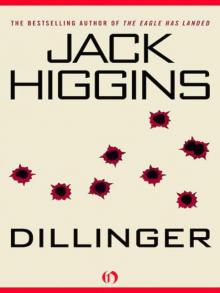 Dillinger (v5)
Dillinger (v5) Eye of the Storm
Eye of the Storm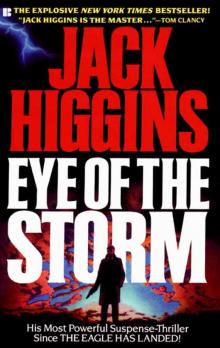 Eye Of The Storm aka Midnight Man
Eye Of The Storm aka Midnight Man A Darker Place
A Darker Place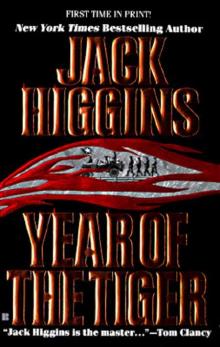 Year Of The Tiger
Year Of The Tiger Death Run
Death Run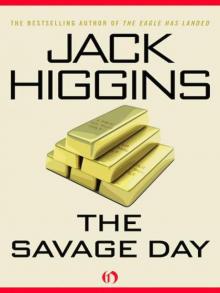 the Savage Day - Simon Vaughn 02 (v5)
the Savage Day - Simon Vaughn 02 (v5)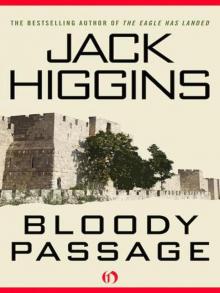 Bloody Passage (v5)
Bloody Passage (v5)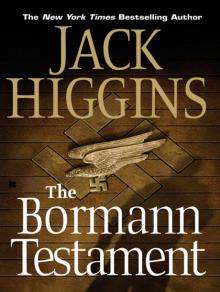 The Bormann Testament
The Bormann Testament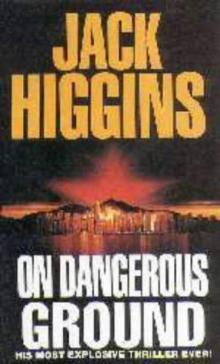 On dangerous ground sd-3
On dangerous ground sd-3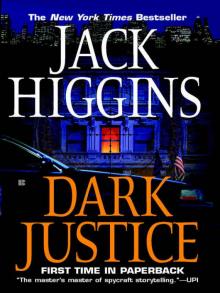 Dark Justice
Dark Justice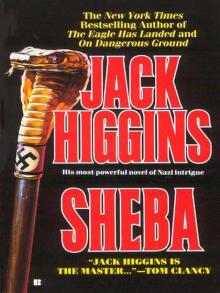 Sheba
Sheba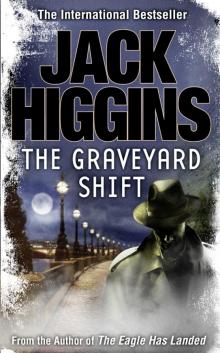 The Graveyard Shift
The Graveyard Shift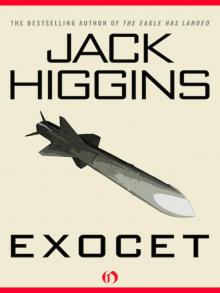 Exocet (1983)
Exocet (1983)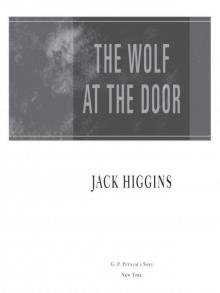 The Wolf at the Door
The Wolf at the Door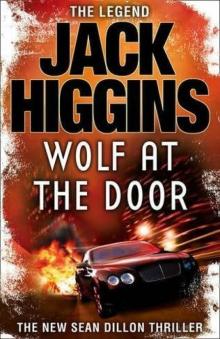 The wolf at the door sd-17
The wolf at the door sd-17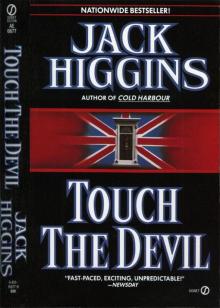 Touch The Devil
Touch The Devil The President’s Daughter
The President’s Daughter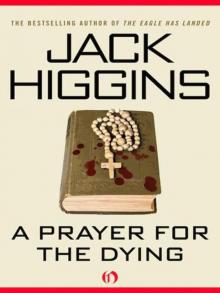 A Prayer for the Dying (v5)
A Prayer for the Dying (v5)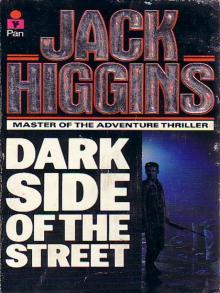 Dark Side Of The Street
Dark Side Of The Street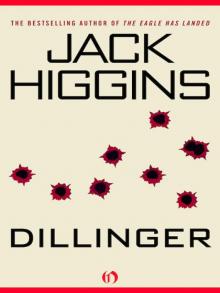 Dillinger (1983)
Dillinger (1983)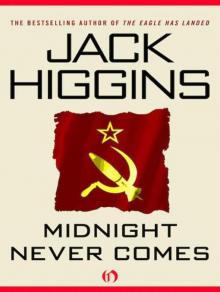 Midnight Never Comes pc-4
Midnight Never Comes pc-4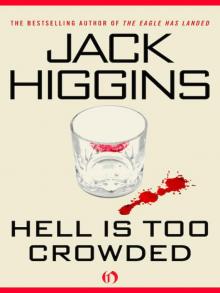 Hell Is Too Crowded (1991)
Hell Is Too Crowded (1991)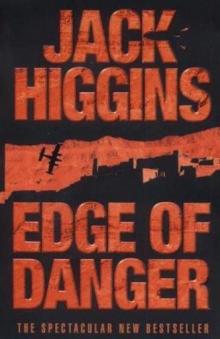 Edge of Danger sd-9
Edge of Danger sd-9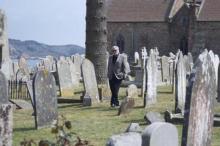 The Thousand Faces of Night (v5)
The Thousand Faces of Night (v5)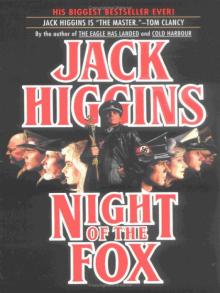 Night Of The Fox
Night Of The Fox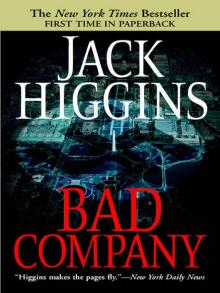 Bad Company
Bad Company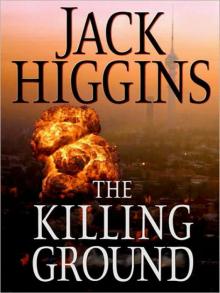 The Killing Ground
The Killing Ground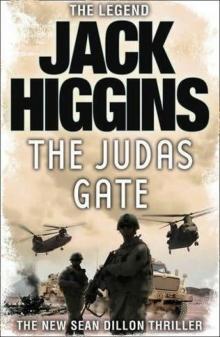 The Judas gate sd-18
The Judas gate sd-18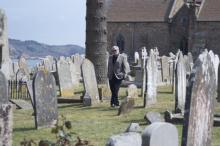 The Thousand Faces of Night (1961)
The Thousand Faces of Night (1961)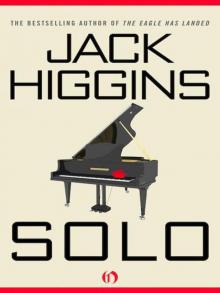 Solo (Aka the Cretan Lover) (v5)
Solo (Aka the Cretan Lover) (v5)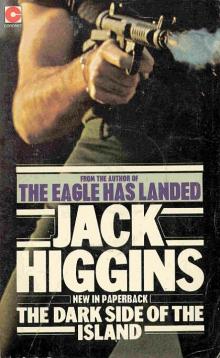 The Dark Side Of The Island
The Dark Side Of The Island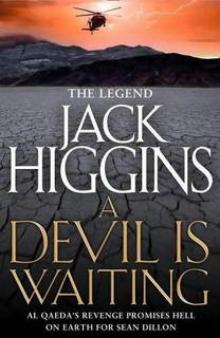 A Devil is vaiting sd-19
A Devil is vaiting sd-19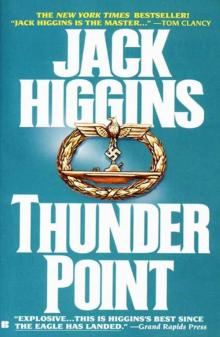 Thunder Point
Thunder Point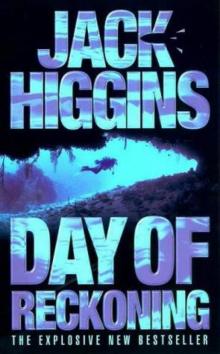 Day of Reckoning sd-8
Day of Reckoning sd-8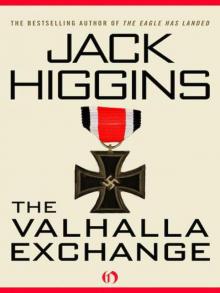 the Valhalla Exchange (v5)
the Valhalla Exchange (v5)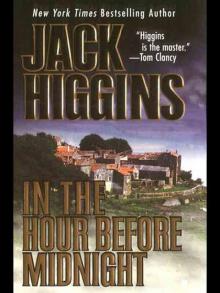 In the Hour Before Midnight
In the Hour Before Midnight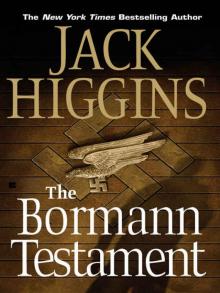 The Bormann Testament (The Testament of Caspar Schultz)
The Bormann Testament (The Testament of Caspar Schultz) The Judas Gate
The Judas Gate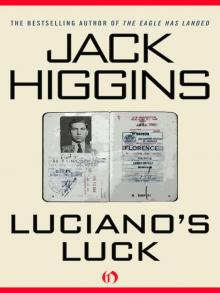 Luciano's Luck
Luciano's Luck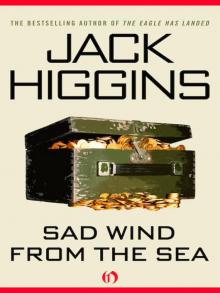 Sad Wind from the Sea (1959)
Sad Wind from the Sea (1959)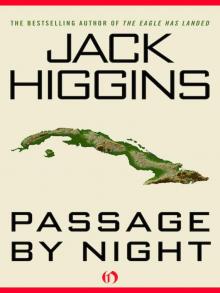 Passage by Night (1987)
Passage by Night (1987)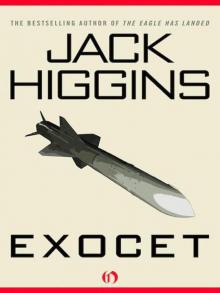 Exocet (v5)
Exocet (v5)